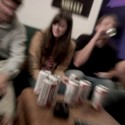Canadians spend millions drinking just to sleep
Canadians are spending hundreds of millions of dollars every year self-medicating their insomnia with alcohol, a new study suggests.
“We were very surprised to see that so many people use alcohol as a way to promote sleep, particularly because it has more detrimental than beneficial effects on sleep,” says Charles Morin, a professor of psychology at Laval University and one of the authors of the study, published this week in the journal Sleep.
Overall, eight per cent of the sample reported using alcohol as a sleep aid. Among people with insomnia, 28 per cent reported self-medicating with alcohol.
The study, one of the first in Canada to put numbers to the societal and economic burden of insomnia, estimates the total annual costs of the sleep disorder in Quebec alone is $6.5 billion.
“We know insomnia is a very prevalent problem, it has a very negative impact on people’s quality of life,” Mr. Morin said. “If we can show that it’s 10 times more costly not to treat insomnia because of its impact on absenteeism from work and reduced productivity than it is to treat it, why aren’t we treating it more often?”
Part of the problem is that so few people seek help. Mr. Morin says some people take sleeping pills, “but there are many more who self-medicate with over-the-counter products or, worse, with alcohol.”
“Why do people do that? Is it because they’re scared of using prescribed sleeping pills because of the stigma associated with it, or because they don’t know there are other treatment options available?”
The research found the money spent on the use of booze as a sleep aid far exceeds costs associated with visits to doctors and the use of prescription pills and over-the-counter products from antihistamines to herbal teas.
“The idea that schnapps before your bedtime is good for your sleep might have been right about 100 years ago, as long as it was the occasional schnapps,” said Dr. Adam Moscovitch, medical director of the Canadian Sleep Institute and associate clinical professor at the University of Calgary.
“When you knock yourself out as a way of dealing with it, if you can’t shut your mind off in any other way, then alcohol has a very negative effect on your sleep. It deprives you of any of the deep stages of sleep and, once it wears off, it has a rebound effect. So your problem becomes much worse.”
Of the $6.5 billion estimated annual costs associated with insomnia in Quebec, the biggest indirect cost by far — $5 billion — was reduced productivity.
The highest direct cost — $339.8 million — was money spent on alcohol to help sleep. By comparison, an estimated $16.5 million was spent on prescription drugs, and $1.8 million for over-the-counter products.
The study involved Quebec only, but the researchers are doing a similar study throughout Canada. “I expect we will get pretty much the same results,” Mr. Morin says.
The study, based on a random sample of 948 adults, distinguished between those people who drink at the end of the day, and those who use booze specifically to help them sleep, meaning they drink before bedtime or in the middle of the night.
The worrisome thing is that insomnia is becoming more common, sleep researchers say.
True insomnia is a significant sleep disturbance lasting for at least a month. People have trouble falling asleep, staying asleep, waking too early or “waking up and feeling like you were run over by a truck,” Dr. Moscovitch says.
According to the study, between six and 10 per cent of the population meets diagnostic criteria for “insomnia syndrome,” and about a third show symptoms “at any given moment.”
Canadians today live in a stressed society with multiple pressures balancing work and family responsibilities. “One of the things we cut corners on is our sleep,” Dr. Moscovitch said.
source: Ottawa Citizen


